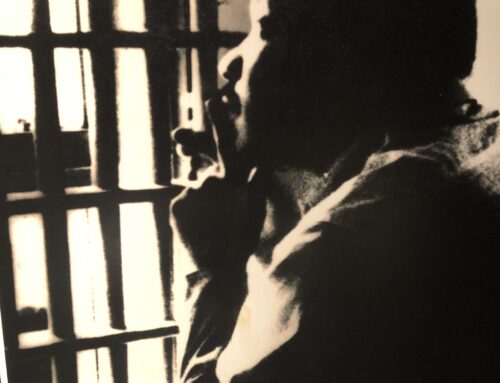
Whatever their story, every person is not only worth protecting, but they are worthy of the highest honor.
Opportunities to join efforts to care for the vulnerable are greater than ever. Churches, non-profits, political activists, think tanks, and advocacy groups make for a strong voice and an energetic and effective pro-life movement. By God’s grace, we are making progress, and we must push forward.
But perhaps our greatest weapon in the fight for life isn’t what we might think. Political action is essential. Educating the public is important. Resourcing groups who serve the vulnerable must be a top priority.
As important as political action and public engagement are, nothing, however, is more powerful in our advocacy for the vulnerable as our thoroughly consistent, biblically shaped, personal pro-life ethic.
If we will take a moment, we may find that our pro-life views often stop short and, as a result, lose their power to affect the change we hope to see. Perhaps we can be better pro-lifers.
A better pro-lifer sees every life as worth the trouble.
None of us need biblical evidence for our own blinded selfishness, but just in case, “The heart is more deceitful than anything else, and incurable–who can understand it?” Jeremiah 17:9 Even as recipients of saving grace, our hearts are prone to wander away from Jesus and away from his heart for the world.
Pastor Micah Fries recently posted on Twitter, “The left can show little regard for the unborn child. The right can show little regard for the refugee child. Both can show little regard for the dignity and worth of every human life. Christians, we embrace a genuine commitment to life and advocate on behalf of all of the above.”
He rightly commends conservative’s readiness to aid the unborn while at the same time outs our resistance to care for the refugee.
Interestingly, the objections from pro-life Christians regarding making space for refugees often center around the complicated issues related to caring for them. These complications are real and require careful consideration. We cannot do everything we want to do for every refugee in need of our help.
Having three children and welcoming a fourth into our family later, however, I’ve discovered that caring for my own children is quite complicated as well.
Actually, humans, all of us, are complicated. We all have various needs. We all require the help and sacrifice of other people. We are all expensive. And any one of us at any time can pose a threat to another person’s way of life.
So the question is not, “Should we care for image bearers who are fleeing for their lives?” but rather, “How can we care for these image bearers?” “How can we responsibly and effectively mirror God’s heart as we love our neighbors, whoever they are?”
Being pro-life, then, means exposing the darker places of our heart and calls us to a purer, less defiled religion that more closely images the character of our Creator.
A better pro-lifer steps back to showcase Jesus’ sufficiency in all things.
Many of us started the year with New Year’s resolutions. I’m all for that. Clarifying our calling and aligning our daily priorities accordingly are important. If, however, our ambitions only focus on a healthier, wealthier, and happier me, then we are missing what it means to be pro-life.
God has not called us to a miserable life, but he has called us to a sacrificial one that follows the pattern of John the Baptist, who saw Jesus and said, “He must increase. I must decrease” (John 3:30).
God is glorified when we take a step back and showcase the beauty and all-encompassing sufficiency of Jesus. But not only is God pleased by that, but the people around us are better served when they see more of Jesus and less of us.
John the Baptist knew that what his own disciples needed most was to follow Jesus. He valued people enough to release lesser goals of personal kingdom building in order to pursue Jesus’ Kingdom first. Not so ironically, pro-life people voluntarily die to themselves so others will experience new life in Jesus.
In all the good advocacy work we do on behalf of the vulnerable, evangelicals often miss the self-emptying example of John and of Jesus. Rather than humbling ourselves, rather than seeking to understand, rather than valuing the unique contribution of our own brothers and sisters in Christ, we divide into lesser kingdoms of our own making.
The Southern Baptist Convention (among whom I’m proudly numbered), for example, is perhaps the largest network of biblically-faithful, Christ-centered, Great Commission-driven churches on the planet. As churches and denominations wane in their commitment to the Scriptures, Bible-believing evangelicals have a unprecedented opportunity in this era of human history to “proclaim to the Gentiles the incalculable riches of Christ, and to shed light for all about the administration of the mystery hidden for ages in God who created all things” (Ephesians 3:8-9).
Yet the moment passes by and the light of the Gospel is dimmed as we create and fuel divisions around smaller kingdoms. We communicate contempt for one another while preaching God’s love for the world. We publicly accuse the brethren while advocating for the stranger. We assume the worst in one another’s motives while promoting the grace of God in the public square.
A pro-life ethic that minimizes the dignity of our closest friends is not a pro-life ethic that will prove God’s love for our fiercest opponents.
Short only of the Gospel itself, our love for one another is the richest resource at the disposal of the pro-life movement we aspire to lead. Perhaps Jesus knew that when he prayed his disciples would be united so that the world would believe on him.
A better pro-lifer makes the most noise about the Gospel.
One of the marks of an evangelical is our belief in the exclusivity and sufficiency of the Gospel. We believe that every person is both created in the image of God and is a sinner, separated from God. But in his great love, God sent his Son Jesus to pay the penalty of our sin through his death, burial, and resurrection.
Our reliance on the Gospel personally transforms us and intrinsically shapes our congregational life, but we often struggle to apply this Good News in the public square.
Take the recent Super Bowl half-time show for example. Not surprisingly, it wasn’t exactly family-friendly. Actually, it was heavy on overt sensuality bordering on pornographic.
On the one hand, there was evangelical outrage over the moral decline of society. Many Christians took to social media to decry the perversion. Other Christians, however, took a different approach. Instead of focusing on the sexuality on display, they chose to affirm the artistry and ethnic diversity of the event.
Both groups made good points, but may have missed the most important one.
Sexual perversion inherently distorts the Imago Dei by exploiting human beings to a destructive end.
We are not most outraged, however, because people are vulnerable to sexual temptations. As fellow sinners, we understand the gravitational pull toward lust, for example. Nor do we fail to celebrate the advancement of minorities in a majority white culture.
It’s good to do good, and evangelicals must stand against systemic, societal sin, but the Gospel does not make us primarily arbiters of moral decency or architects of ethnic diversity.
Our pro-life ethic, rooted in historical, biblical theology, leads us, instead, to use our outside voices to declare the beauty of the Gospel as we promote the glory of God among his most prized creation, man and woman—every man, woman, boy, and girl. Our love for people from every tribe and tongue and from every class and capacity compels us to champion what is best for them by leading them to embrace their Creator and to live according to his purposeful and good design.
So when we see humans, whoever they are, exploited, our public ministry is motivated by passion for God’s glory and compassion for people to experience his rich mercy. Our work is not to remind pre-Christians that they are out and we are in, but to plead with them as winsomely and urgently as possible as fellow sinners to be reconciled to God.





